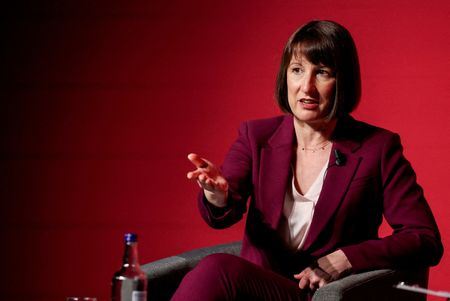By William Schomberg
LONDON (Reuters) -British public borrowing in the first six months of the tax year came in higher than official forecasts, according to data that underscored the challenge facing finance minister Rachel Reeves in her first budget next week.
Borrowing hit 79.6 billion pounds ($103.5 billion) between April and September – almost 7 billion pounds more than expected by the Office for Budget Responsibility, which produces the projections that underpin government budgets.
In September alone, borrowing stood at 16.6 billion pounds, the Office for National Statistics said on Tuesday.
That was below a median forecast of 17.5 billion pounds in a Reuters poll of economists but higher than the Office for Budget Responsibility’s projection of 15.1 billion pounds made earlier this year.
It was the third biggest September borrowing total since records began in 1993.
Bigger-than-expected borrowing so far in this financial year has been driven by higher-than-expected public spending.
Alex Kerr, an economist with Capital Economics, said the figures highlighted Reeves’s limited scope to increase day-to-day spending without raising taxes.
“That said, if she tweaks her fiscal rules, she will still have room to raise public investment,” Kerr said.
Reeves – who wants to increase public spending to improve services and upgrade Britain’s infrastructure – has said taxes will go up but she has ruled out increases in most of the main rates of taxation.
Prime Minister Keir Starmer has said the burden should fall on those with the broadest shoulders.
That means increases are expected in taxes paid mostly by wealthier individuals, such as capital gains, dividend and inheritance taxes, as well as employers’ contributions to the social security system.
Some employers groups have warned that raising these taxes could jeopardise the government’s target of doubling the pace of Britain’s economic growth.
Reeves has accused the former Conservative government of leaving her with a 22 billion-pound fiscal hole due to over-spending.
The Conservatives deny the claim and say Reeves is setting the stage for tax increases that she will seek to pin on them.
“Today’s data highlights the scale of the public finances challenges facing the Chancellor as she grapples with over-spending today, the need to avoid austerity in the future, and having to fund extra public service spending through tax rises,” said Cara Pacitti, a senior economist at the Resolution Foundation think tank.
Reeves is widely expected to change the government’s self-imposed fiscal rules to give herself more room to borrow for investment although, mindful of the 2022 bond market crisis sparked by former prime minister Liz Truss’s plans for big tax cuts, she is likely to move carefully, investors say.
Despite the spending overshoot, Rob Wood, chief UK economist at Pantheon Macroeconomics, said Reeves’ decision to cut winter fuel payments for pensioners appeared to have helped bring borrowing in September closer to the March budget forecasts.
Britain’s statistics office said public debt stood at 98.5% of gross domestic product in September and was no longer estimated to have hit 100% in August. Public debt in August was now shown at 98.8% of GDP, it said.
($1 = 0.7691 pounds)
(Additional reporting by Suban Abdulla; Editing by Andrew Heavens and Christina Fincher)










